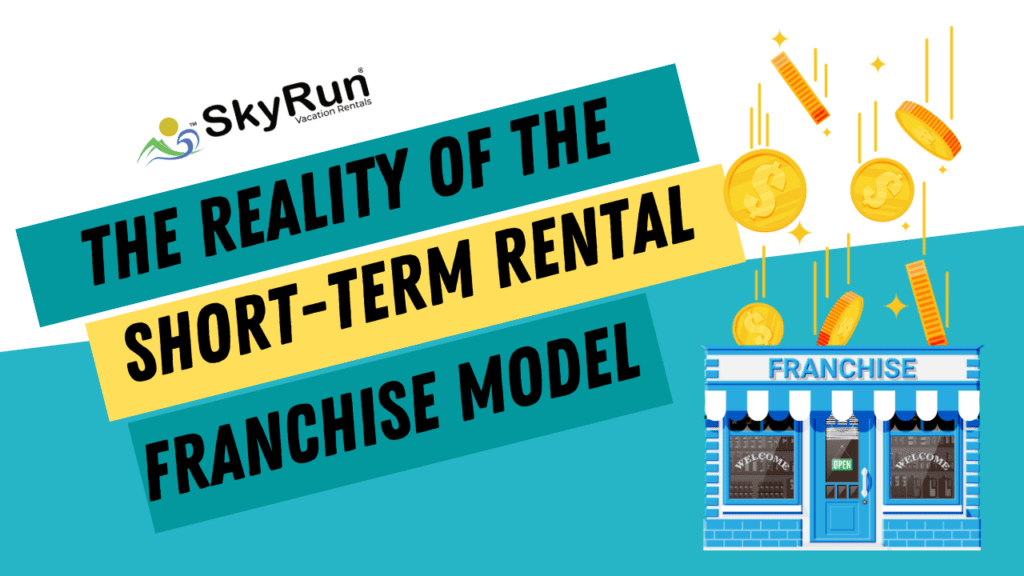In an industry as competitive as short-term rentals, rapid expansion is no easy feat. Yet, SkyRun Vacation Rentals has managed to scale its property portfolio from 950 to a whopping 1,200 within just two years. This significant growth is largely credited to their innovative use of a franchise model. But what exactly is driving short-term rental operators to choose SkyRun?
A quick glance at testimonials on the SkyRun website reveals the allure of the franchise model. A franchisee in Breckenridge, Colorado, generated over $800,000 in revenue within just 18 months, while another in Estes Park achieved a 20% market share and a 90% annual occupancy rate in three years.
But does that make franchising a foolproof strategy for those looking to strike it rich in short-term rentals? The short answer is no. As with anything, there are a variety of factors that pave the path to success.
With the right guidance and resources, however, the franchise model can help navigate challenges, optimize your operations, and scale your business more effectively than if you were to venture out on your own.
This article aims to shed light on how the franchise model works in the vacation rental sector, how to get started, the requirements involved, and the inherent advantages and disadvantages.
To guide us through this journey, we’ve tapped into the insights of SkyRun CEO Lukas Krause, offering a firsthand look at how SkyRun operates its franchises.
What Joining a Short-Term Rental Franchise Means
As a franchisee, you essentially become a business owner, leveraging the technology, systems, and expertise of an established brand to build your own successful venture.
You’re tasked with running your own business, which includes budgeting, staffing, pricing, day-to-day operations, distribution, and marketing. You’re also responsible for sourcing and signing new homeowners into your portfolio and ensuring those properties are booked with guests.
In return, you gain access to a proven business model, cutting-edge technology, essential tools, and professional guidance. This support system can significantly streamline your operations, accelerate your growth, and minimize potential missteps.
“At SkyRun, we like to say that this represents the ‘Best of Both Worlds in Vacation Rental Management’–boutique service, with big-brand results,” offers SkyRun CEO Lukas Krause.
SkyRun Vacation Rentals: From Licensing to Franchising

SkyRun Vacation Rentals, established in 2004 by Barry Cox and Steve Falk, initially operated as a single-location company in Keystone, Colorado. Recognizing the potential of the booming vacation rental industry, they expanded SkyRun’s reach through a licensing model, while maintaining its local business essence.
In 2021, following the tragic loss of founder Barry Cox, Lukas Krause took the helm as CEO. With his experience in scaling property management companies, Krause spearheaded the transition from a licensing organization to a franchise model by 2023. Offering a robust turnkey business opportunity, SkyRun is now one of the fastest-growing vacation rental companies, providing entrepreneurs with an efficient property management platform and the support of a committed community.
Currently, SkyRun is focusing primarily on expansion within the United States.
What Franchisees Can Expect from SkyRun:
- Technology: Such as robust property management software, as well as technology to streamline operations and enhance the guest experience.
- Tools: A suite of tools for marketing, distribution, and revenue management.
- Consultative Advice: Drawing on industry expertise, SkyRun offers consultative advice to franchisees, helping them navigate challenges and capitalize on opportunities.
- Templates: Access to tried-and-tested templates for various operational aspects, from contracts to marketing materials. These ready-to-use resources save time and ensure consistency across the SkyRun brand.
- Guidance from SkyRun HQ: Ongoing support and guidance, assisting franchisees in areas like strategy development, compliance, and troubleshooting.
- Access to a Community of Other SkyRun Franchise Owners: SkyRun cultivates a vibrant community of franchise owners, encouraging collaboration and knowledge sharing. This network fosters a sense of camaraderie and provides a platform for peer-to-peer learning and support.
- Extensive Three-Part Training: In addition to these resources, SkyRun offers an extensive three-part training program that can be completed either in person or remotely.
What is the Requirement for Joining a Franchise?
With no requirement to own real estate, the ability to launch without a physical office, and no immediate need for equipment or supplies, this model offers distinct advantages. Entrepreneurs can swiftly immerse themselves in the business, acquire necessary skills, and set their venture in motion.
However, there are several core requirements to consider before embarking on this entrepreneurial journey:
- Franchise Fee: A franchise fee is typically required for joining a franchise. This one-time payment covers the cost of using the franchisor’s brand name, systems, and resources.
- Royalty Fee: Franchisees often pay a royalty fee, usually a percentage of their revenue, to the franchisor for ongoing support and access to the franchise network.
- Business Experience: Most franchises prefer franchisees with a certain level of business experience, as it demonstrates an understanding of business operations and decision-making. For instance, SkyRun requires its franchisees to have a minimum of 10 years of experience.
- Capital Investment: Depending on the franchise, the overall investment can range significantly. It may include costs for marketing, equipment, and other startup expenses. The SkyRun estimate for this investment is about $100,000.
- Commitment: A full-time commitment is typically required, especially during the initial stages of setting up the business.
- Legal Compliance: Franchisees need to adhere to local zoning laws, tax rules, and any other legal regulations pertinent to running a short-term rental business.
- Proven Business Plan: Having a comprehensive business plan that aligns with the franchisor’s model is crucial. It should outline how the franchisee intends to grow the business and achieve financial goals.
Specific requirements may vary between franchises, so thorough research and due diligence are essential when considering different opportunities. “While there is not one-size-fits-all background that makes the ‘perfect franchisee,’ there are several qualities that we find are common in our most successful franchisees,” clarifies Krause. “These individuals are ambitious, have the ability to deliver results independently, are passionate about delivering tremendous hospitality experiences, and are problem-solvers who can be adaptable and make effective, efficient decisions.”
Arguing in Favor of and Against the Franchise Model
Joining a property management franchise can bring significant benefits, but it’s also important to be aware of potential drawbacks. Here’s a look at both sides of the coin:
Advantages
- Proven Business Model: Franchises offer a tried-and-true business model. The systems, procedures, and best practices have been refined over time, reducing the risk of making costly mistakes as you establish your business.
- Easily Marketability: As part of a franchise, you benefit from brand recognition and reputation, which can be challenging to establish as an independent operator. This trust can attract more homeowners and guests to your services.
- Operational Support: Franchisors offer extensive support that often includes training, technology, and operational tools. This support works to streamline your everyday tasks, enabling efficient property and guest management. Krause underscores this point, stating, “By joining a franchise, you are buying in on a certain set of resources that have been vetted and set up to maximize success for your business.“
- Marketing Power: Franchises often conduct extensive marketing campaigns at the national or regional level. This collective effort can drive more bookings to your properties and reduce the marketing burden on individual property managers.
- Shared Knowledge and Community: Becoming a franchisee means tapping into the collective wisdom and experience of other franchise owners. Lukas elaborates on this, saying, “Joining a franchise also means joining a community of peers who are facing the same challenges, which can be a tremendous resource to avoid common mistakes and navigate business hurdles as the business grows and industry evolves. It is wonderful to know that you are not alone when the unexpected happens, and being a part of a franchise means you are never doing it all alone.“
- Competitive Edge: Franchises often provide comprehensive support and resources to help their franchisees stay competitive in the local market.
Challenges
- Initial Investment: Joining a franchise typically requires an initial investment, including franchise fees and ongoing royalty or commission payments. This financial commitment can be a hurdle for some property managers. “However,” as Krause from SkyRun points out, “the costs to join SkyRun are comparable to investing in some of the PMS software solutions in the space, but we offer so much more.” It’s essential to balance the value of the franchise support against these costs.
- Franchise Fees: Franchisees typically pay a one-time franchise fee and ongoing royalties, which can impact profitability. You’ll need to weigh the value of the franchise support against the costs involved.
- Loss of Autonomy: Franchisees must adhere to the established systems and procedures of the franchisor. This can limit your freedom to make independent decisions, which may not align with your business vision. Krause acknowledges this, saying, “a franchise may not be the right path for someone who wants total control over their business without being beholden in any way to a larger group. However, we believe the trade-off is worthwhile for the certainty of walking a proven path alongside successful peers.“
- Uniformity: Franchise models often emphasize uniformity across all locations. This may restrict your ability to tailor your services to the unique demands of your local market. SkyRun, however, provides operational flexibility to its franchise owners. “We understand that no two markets–and no two business owners–are exactly alike. We strive to offer a model that allows for extensive customization to meet every franchisee’s unique needs,” says Krause. He further explains that while they expect franchisees to utilize certain tools, they also allow for choices within that framework that best suit individual businesses, demonstrating the model’s flexibility through various successful paths taken by previous franchisees.
- Market Saturation: If the franchisor sells too many franchises in a specific area, it could lead to market saturation and increased competition among franchisees.
- Exit Challenges: Exiting a franchise can be complex and costly. You may need to sell your franchise or navigate contractual obligations, which can pose challenges if you wish to transition out of the franchise.
The decision to join a property management franchise should be made after thorough research and consideration of these factors. While the advantages can be compelling, it’s crucial to weigh them against the potential challenges to determine if this is the right move for you.
How the Franchise Model Adapts to Different Regions and Markets
In the world of short-term rentals, a one-size-fits-all approach is often an impractical strategy. For instance, SkyRun operates across a diverse array of territories, including mountain, urban, beach, lake, and desert regions. Each territory presents unique market conditions, while each franchisee brings individual backgrounds, strengths, goals, and approaches to the table. This necessitates adaptable systems, tools, and resources that can support efficient operations irrespective of the regional context.
Example: Regulatory Complexities
One example of this adaptability is evident in how SkyRun franchisees navigate complex tax structures and regulatory environments. Rules on short-term rentals can vary significantly across regions, with a single franchise sometimes having to comply with multiple municipalities’ rules and regulations. In response to such situations, SkyRun HQ has collaborated with franchisees to accommodate both conventional short-term rentals and properties that host stays of 30 days or more – a strategy aimed at ensuring compliance with short-term rental permit requirements.
Operational Flexibility: The Key to Adaptation
Operational flexibility is a vital aspect of successful adaptation. Every business faces unique considerations, be it in terms of length of stays, staffing structures, pricing models, fee structures, distribution partners, add-on services, insurance options, or check-in procedures. SkyRun acknowledges these variations and has developed versatile solutions to cater to every franchisee’s specific needs.
As Krause puts it, “Whether it be accommodating various lengths of stays, staffing structures, pricing models and fee structures, distribution partners, add-on services, insurance options, check-in procedures, or any other number of operational considerations that may be different from one business to another, SkyRun has solutions for everyone, and other like-minded business owners in our system who have walked the path before.“
This ability to adapt is not just beneficial, but essential for franchises operating in geographically dispersed markets. Local market adaptation often enhances the performance of franchises and increases their competitiveness.
Your Booking Data: Where Does It Go
In the franchise model, data plays a pivotal role in shaping strategies and driving success. This is particularly true in the short-term rental industry, where key performance indicators (KPIs) such as RevPAR (Revenue Per Available Rental), occupancy rates, expenses, review scores, and direct bookings can provide valuable insights.
For franchisors to create repeatable, scalable processes for their franchisees, consistent and organized data collection is crucial. This approach ensures that all franchisees are working with the same set of metrics, facilitating comparability and fostering a unified strategy across the network.
The Power of Comparative Analysis
One significant advantage of being part of a franchise network is the opportunity to benchmark your performance against others in the system. By comparing your KPIs with those of your peers, you can:
- Identify areas of strength and areas that need improvement
- Develop new strategies inspired by successful peers
- Make informed decisions to optimize your own operations
Marketing Benefits of Brand-wide Customer Data
Brand-wide customer data can unlock numerous marketing benefits:
- Cross-marketing opportunities: The franchisor can promote franchises to loyal customers, encouraging them to book stays across the network.
- Rapid exposure for new franchises: New franchisees can quickly reach a large list of qualified customers, accelerating their business growth.
Navigating Data Ownership Agreements
Given these benefits, franchisors often establish data ownership agreements that enable them to collect, store, and communicate with franchisee customers. However, it’s important to note that this doesn’t mean overriding franchisees’ autonomy. For instance, Lukas points out that SkyRun HQ always seeks permission from franchisees before reaching out to their customers.
Conclusion
SkyRun Vacation Rentals stands as a testament to the immense potential of the franchise model approach, demonstrating the power of community, innovation, and adaptability. However, it is also clear that success hinges on your ability to harness the resources, guidance, and unique character of your chosen franchise. This model isn’t a one-size-fits-all solution, but with dedication, smart choices, and unwavering commitment, it can serve as a dynamic accelerator on your path to short-term rental prosperity. The choice is yours—will you venture independently or embark on a journey with a franchise by your side? The answer may very well shape the trajectory of your future in this industry.




![Trump-Era Policies Fuel Travel Uncertainty: Fewer Canadians, Europeans to U.S.—Fewer Americans to Europe [Early Data]](https://www.rentalscaleup.com/wp-content/uploads/2025/04/Trump-Era-Policies-Fuel-Travel-Uncertainty-Fewer-Canadians-Europeans-to-U.S.—Fewer-Americans-to-Europe-Early-Data-150x150.jpg)


